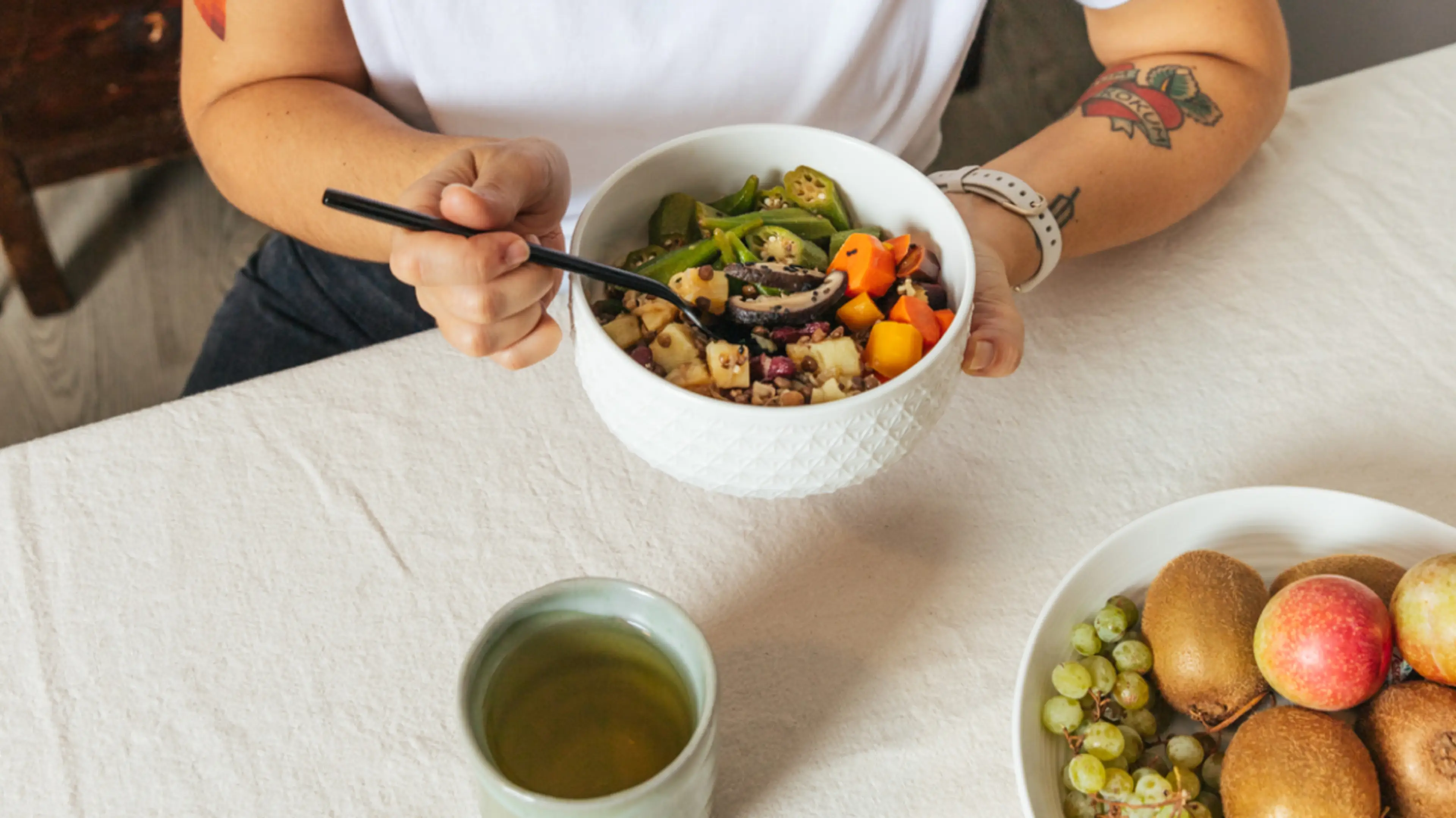TLDR: Women with Polycystic Ovarian Syndrome (PCOS) can have trouble getting pregnant, as PCOS can sometimes affect ovulation. However, there are ways to manage PCOS, and one of them is to try a PCOS diet, which can help boost your fertility and balance your hormones.
Polycystic Ovarian Syndrome is a condition affecting 1 in 10 women1 of reproductive age. If you’re one of these women, conception can feel like an uphill battle. Dr. Marieme Mbaye, an ob-gyn and medical director at Noula2 , expands on the challenges women with PCOS can face when they’re expanding their families.
“PCOS increases the risk of miscarriage in early pregnancy,” she says. “It is also linked to a higher risk of gestational diabetes, pregnancy-induced hypertension, preeclampsia, and preterm birth. It's not all doom and gloom though—the better controlled the PCOS is, the lower all of these risks become.”
To that end, there are ways to manage PCOS for better outcomes, including making some changes to your diet—but first, let’s understand PCOS and its impact on fertility to begin with.
How Do You Know If You Have PCOS?
The first hurdle in dealing with PCOS is to get an official diagnosis. Technically, you must meet two of the three following criteria for an official diagnosis from your ob-gyn:
Irregular periods or no periods
Polycystic ovaries with more than 20 follicles
PCOS and Its Effect on Fertility
So what does PCOS have to do with your fertility potential? A lot, actually. PCOS is responsible for 70% of cases of anovulatory infertility4 . In other words, if you’re diagnosed with PCOS, you may struggle to get pregnant since you may not be able to ovulate.
The science behind the lack of ovulation due to PCOS5 is complex. It stems from insulin resistance causing a disruption in normal signaling between the pituitaries (which typically produce testosterone and estrogen) and the ovaries. The ovaries produce follicles—typically lots of them—but the eggs are never released.
But, there are ways to boost your fertility if you have PCOS.
Many women with PCOS who want to boost their fertility seek the help of a fertility specialist or reproductive endocrinologist to stimulate ovulation. In addition to that, it may also be possible to balance your hormones and boost your fertility through what you eat: the PCOS diet plan.
The Fertility-Boosting Power of the PCOS Diet
To gain insight into how the PCOS diet plan may help boost your fertility, we asked Janine Higbie, MS, CNS, certified nutritionist, and founder of JH Wellness6 , to share what she knows about the relationship between food, fertility, and PCOS.
Expectful: You have extensive experience working with PCOS patients who are struggling with conception. What’s the first thing you want your PCOS clients to know?
Janine Higbie: You are not alone. You may feel that way because PCOS is woefully underdiagnosed. Too often, women struggle in the dark without the support they need during the critical childbearing years. But remember, a PCOS diagnosis is not an infertility sentence. There are many healthcare professionals like myself who are ready, willing, and able to help!
Expectful: How do you help PCOS patients restore and boost fertility?
JH: PCOS manifests in a wide range of symptoms and severity. Many of the symptoms can be masked by oral contraceptive pills. When women come off the pill as part of family planning, they often realize that they struggle with irregular cycles, amenorrhea (lack of period), and anovulation for the first time.
At this point, restoring a regular cycle is paramount, and I do that through nutrition. I do that by putting them on the PCOS diet. I guide women in a fertility-boosting diet that can improve egg quality and increase the chances of conception, a healthy pregnancy, and a baby.
Expectful: How do you collaborate with your patient’s ob-gyn and reproductive endocrinologist to ensure you’re all aligned in prescribing the PCOS diet?
JH: It’s really up to the individual and her physician, but I think communication is critical. I’m always willing to update the physician directly or go through the patient. Proper nutrition is beneficial to egg quality, increased rate of pregnancy, and reduced risk of miscarriage in women undergoing fertility treatments.
Fertility Boosting Foods for PCOS
Expectful: Let’s talk about foods for PCOS. What are the principles a hopeful mom with PCOS should consider when it comes to nutrition?
JH: Due to the connection between PCOS and insulin resistance, a blood sugar-balancing diet is essential. The PCOS diet plan limits carbohydrates, particularly highly processed foods with flour and sugars. The PCOS diet also focuses on eating lean proteins, healthy fats, fiber, and nutrient-rich carbohydrates.
I should note these diet principles are not limited solely to the PCOS diet. They are great diet guidelines for everyone!
Expectful: What are the dos and don’ts for women with PCOS?
JH: Any woman trying to conceive should focus on:
Reducing stress
Participating in regular exercise
Maintaining proper hydration levels
While these are important for all women, they are especially critical for women with PCOS because of hormonal imbalances.
Do eat these fertility-boosting foods for PCOS:
A palm-sized portion of lean organic protein at each meal. Ideal sources include low-mercury fish (like salmon, trout, and sardines), eggs, or legumes.
A minimum of two fist-sized servings of veggies at each meal. “Eat the rainbow” by eating veggies of all colors, emphasizing leafy greens and cruciferous vegetables.
A healthy fat in each meal. Ideal sources include avocado, olives, olive oil, nuts, seeds, and fatty fish.
Low-glycemic carbs like starchy vegetables (potatoes, corn, butternut squash, beans) and whole grains.
Avoid these foods if you are on the PCOS diet:
Processed white flour and sugar, high fructose corn syrup, and artificial sugars
Processed meats and red meat, poultry, or ham in excess
Fried foods and trans fats
Alcohol, or at the very least limit it to 1-2 glasses per week
Caffeine (with the caveat that green tea can be beneficial for PCOS)
The good news is the PCOS diet contains the critical micronutrients for a developing baby in utero, nutritious breast milk, and mom’s postpartum mental health and physical healing. That’s why I like to let my PCOS patients know they are getting a headstart in the nutrition department!
Expectful: If this all feels overwhelming, what’s one thing a hopeful mom with PCOS can do right now to improve her fertility?
JH: One of the most important things a woman with PCOS can do to help boost fertility is to remove inflammatory, ultra-processed foods and sugary drinks from their diet and focus on healthy fats and protein at every meal. Just doing these things can make an immediate improvement in PCOS hormonal dysregulation.
Once these things become routine, you can introduce another one or two changes to work up to maintaining the PCOS diet. Consistency is our best clinical tool, so my job is to provide realistic and actionable advice.
Expectful: What’s your go-to PCOS diet recipe you love to suggest to your PCOS patients?
JH: My pesto salmon and veggies dish7 is a total crowd-pleaser, even among the non-PCOS group! Plus, it couldn’t be easier.












